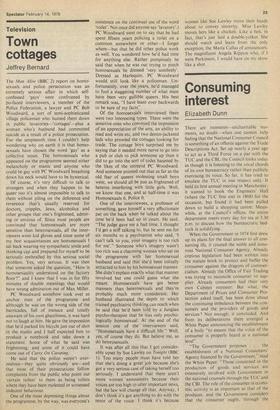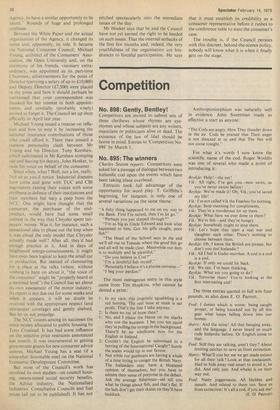Consuming interest
Elizabeth Dunn
There are moments—uncharitable moments, no doubt—when one cannot help feeling that the National Consumer Council is something of an offence against the Trade Descriptions Act. Set up nearly a year ago to act as a Third Force on a par with the TUC and the CBI, the Council looks today as though it is listening to the vocal chords of its own bureaucracy rather than publicly exercising its voice. So far, it has tried to emulate the TUC in one respect only. It held its first annual meeting in Manchester; it wanted to book the Engineers' Hall (where the TUC first met in 1868) for the occasion, but found it had been pulled down to build a shopping centre. Meanwhile, at the Council's offices, the entire department meets every day for tea at 3.30 p.m. to discuss how the bureaucratic bedrock is solidifying.
When the Government in 1974 first drew up its plans for the final answer to all consuming ills, it created the noble and sonorous National Consumer Agency. Already copious legislation had been written into the statute book to protect and buffer the consumer against the dragons of commercialism. Already the Office of Fair Trading was trying to reconcile consumer to supplier. Already consumers had their very own Cabinet minister. But what, the Department of Prices and Consumer Protection asked itself, has been done about the continuing imbalance between the consumers and the providers of goods and services? Not enough, it concluded. And from its deliberations there emerged a White Paper announcing the establishment of a body "to ensure that the voice of the consumer is properly heard at a national level".
"The Government proposes . . the establishment of a National Consumers' Agency financed by the Government," read the White Paper. "Those concerned in the production of goods and services are extensively involved with Government in the national counsels through the TUC and the CBI. The role of the consumer in economic activity is as important as that of the producer, and the Government considers that the consumer ought, through the Agency, to have a similar opportunity to be heard." Rounds of huge and prolonged applause.
Between the White Paper and the actual organisation of the Agency, it changed its name and, apparently, its role. It became the National Consumer Council; Michael Young, architect of the Consumers' Association, the Open University and, on the testimony of his friends, visionary extraordinary, was appointed as its part-time Chairman; advertisements for the posts of Director (carrying a salary of up to £10,000) and Deputy Director (£7,500) were placed in the press and here it should perhaps be mentioned that your correspondent was thanked for her interest in both appointments and cordially (probably wisely) invited to forget it. The Council set up shop officially in April last year.
Michael Young issued a treatise on inflation and how to stop it by increasing the national insurance contributions of those who could afford it. There then ensued a massive personality clash between Mr Young and his Director, Tony Kershaw, which culminated in Mr Kershaw stomping out and leaving his deputy, John Hosker, to raise his voice on behalf of the consumer.
Since when, what ? Well, not a lot, really. Not so as you'd notice. Industrial disputes have come and gone with TUC and CBI negotiators raising their voices with some shrillness in defence of their institutions and their members but nary a peep from the NCC. One might have thought that the consumer, the purchaser of the endproduct, would have had some small interest in the way that Chrysler spent taxpayers' money. Was it, for instance, such a sensational idea to phase out the Imp when It was about the only model that Chrysler actually made well? After all, they'd had enough practice at it. And in days of heightened energy-consciousness, it might have even been logical to keep the small car in production. But instead of clamouring for a place at the talks (where, without wishing to harp on about it, "the voice of the consumer" might be "properly heard at a national level") the Council has set about its own assessment of the motor industry. Its report is not due out for some weeks and when it appears, it will no doubt be received with the appropriate respect (and newspaper coverage) and gently shelved. But let us not prejudge.
The NCC counts among its successes the extra money allocated to public housing by Tony Crosland. It has had some influence on the selective price restraints announced last month. It was instrumental in getting government grants for new consumer advice centres. Michael Young has a seat (if a somewhat downtable one) on the National Economic Development Committee.
But most of the Council's work has involved its own studies—on council housing. means-tested social security benefits, the Advice industry, the Nationalised Industries' Consultative Councils and fuel prices (all yet to be published). It has not pitched spectacularly into the immediate issues of the day.
Mr Hosker says that he and the Council have not yet earned the right to be heeded on such issues. That the internal setbacks of the first few months and, indeed, the very youthfulness of the organisation are hindrances to forceful participation. He says that it must establish its credibility as a consumer representative before it rushes to the conference table to state the consumer's case.
The trouble is, if the Council persists with this discreet, behind-the-scenes policy, nobody will know what it is when it finally gets on the stage.



































 Previous page
Previous page